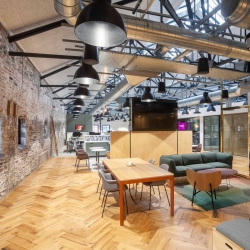October 14, 2021
Search Results for: technology
October 12, 2021
Brits shun traditional working hours, favouring flexibility and family life
by Jayne Smith • Flexible working, News, Working lives
 New research released by Samsung Electronics Co Ltd, claims that Brits are feeling much more relaxed about the new world of work and redefining what is now ‘acceptable’ when it comes to working norms – including sending work emails from the school run, using short form and emojis in emails to the boss, or working in pyjamas from the bedroom. (more…)
New research released by Samsung Electronics Co Ltd, claims that Brits are feeling much more relaxed about the new world of work and redefining what is now ‘acceptable’ when it comes to working norms – including sending work emails from the school run, using short form and emojis in emails to the boss, or working in pyjamas from the bedroom. (more…)
October 12, 2021
Workers feel more trusted and motivated thanks to hybrid working
by Jayne Smith • Flexible working, News, Working lives
 New research from Kadence (formerly Chargifi) claims that after a year of flexible working, almost two-thirds of US and UK office workers (62 percent) now feel more trusted to do their job effectively. Of those workers, half also feel more motivated to do a better quality job (51 percent) and go the extra mile (48 percent) thanks to their new working arrangements. (more…)
New research from Kadence (formerly Chargifi) claims that after a year of flexible working, almost two-thirds of US and UK office workers (62 percent) now feel more trusted to do their job effectively. Of those workers, half also feel more motivated to do a better quality job (51 percent) and go the extra mile (48 percent) thanks to their new working arrangements. (more…)
October 6, 2021
Hybrid workers retain concerns of discrimination, career and always on culture
by Jayne Smith • Flexible working, News, Working lives
 Poly has released a new report outlining the evolution of the workplace and changing employee attitudes to the 9-5. The Poly Evolution of the Workplace report provides analysis on the findings of a survey of 7,261 hybrid workers from the UK, France, Germany, Spain, Sweden, Poland and the United Arab Emirates. It examines how attitudes and behaviours have evolved – looking at everything from working patterns and culture, to frustration and noise, right down to what we wear. (more…)
Poly has released a new report outlining the evolution of the workplace and changing employee attitudes to the 9-5. The Poly Evolution of the Workplace report provides analysis on the findings of a survey of 7,261 hybrid workers from the UK, France, Germany, Spain, Sweden, Poland and the United Arab Emirates. It examines how attitudes and behaviours have evolved – looking at everything from working patterns and culture, to frustration and noise, right down to what we wear. (more…)
October 1, 2021
Almost half of UK employees say workplace has negatively impacted wellbeing during pandemic
by Jayne Smith • News, Wellbeing

New research by Edays, who surveyed employees across the UK to determine the impact of the workplace on employee wellbeing, and changes to employee perceptions over the past two years, claim that 41 percent of the workforce feel that their workplace has negatively impacted on their wellbeing during the pandemic. (more…)
September 30, 2021
‘Great Resignation’ means companies must adapt to needs of workers
by Neil Franklin • News
 Workers are leaving jobs like never before, and it’s causing a shortage of talent that has companies around the globe reeling, according to a survey conducted by Citrix Systems. Based on a poll of 1,000 US based knowledge workers, 40 percent have left at least one job in the past year or are considering doing so. The report from the firm sets out the factors behind the so-called Great Resignation and what firms may have to do in response. (more…)
Workers are leaving jobs like never before, and it’s causing a shortage of talent that has companies around the globe reeling, according to a survey conducted by Citrix Systems. Based on a poll of 1,000 US based knowledge workers, 40 percent have left at least one job in the past year or are considering doing so. The report from the firm sets out the factors behind the so-called Great Resignation and what firms may have to do in response. (more…)
September 24, 2021
Three quarters of firms planning to change work culture
by Jayne Smith • Business, News, Working culture
 Socio-economic fault lines exposed by COVID-19 are creating an unforgiving marketplace, with companies under scrutiny from governments and the public and little room to avoid disputes and investigations into business practices and behavior, according to a new report from FTI Consulting, Inc. (NYSE: FCN). (more…)
Socio-economic fault lines exposed by COVID-19 are creating an unforgiving marketplace, with companies under scrutiny from governments and the public and little room to avoid disputes and investigations into business practices and behavior, according to a new report from FTI Consulting, Inc. (NYSE: FCN). (more…)
September 23, 2021
People leaders lack the training, knowledge and tools to effectively handle employee issues
by Jayne Smith • News, Working culture
 HR Acuity has announced the research findings from a recent survey, People Leaders and the Gap in Managing Employee Issues. The report, which includes data from 126 enterprise employee relations leaders and from nearly 700 people leaders from a wide range of industries and company sizes, provides insight into how people leaders handle employee issues such as policy violations, performance concerns and behavioral issues. (more…)
HR Acuity has announced the research findings from a recent survey, People Leaders and the Gap in Managing Employee Issues. The report, which includes data from 126 enterprise employee relations leaders and from nearly 700 people leaders from a wide range of industries and company sizes, provides insight into how people leaders handle employee issues such as policy violations, performance concerns and behavioral issues. (more…)
September 22, 2021
Employers worry about remote work productivity, but majority fail to invest in solutions
by Jayne Smith • Flexible working, News, Technology
 New research released by Ricoh Europe claims that employers are failing to invest in technology to maintain productivity across their remote workforce, despite concerns about their output. More than 18 months since the Coronavirus pandemic took hold across Europe, forcing businesses to adopt remote working practices, just over a third (36 percent) of employers say their organisation has provided the tools and technology to maintain employee productivity while working from any location. (more…)
New research released by Ricoh Europe claims that employers are failing to invest in technology to maintain productivity across their remote workforce, despite concerns about their output. More than 18 months since the Coronavirus pandemic took hold across Europe, forcing businesses to adopt remote working practices, just over a third (36 percent) of employers say their organisation has provided the tools and technology to maintain employee productivity while working from any location. (more…)
September 22, 2021
More hybrid working to bring 3.8 million Brits into employment
by Jayne Smith • Flexible working, News, Working lives
 Hybrid working could bring nearly four million people “locked out” from work such as parents, carers and disabled people into the workforce and enable part-time workers to work more hours adding £48.3bn to the UK economy each year, according to a new study by Virgin Media O2 Business and the Centre for Economics and Business Research (Cebr). (more…)
Hybrid working could bring nearly four million people “locked out” from work such as parents, carers and disabled people into the workforce and enable part-time workers to work more hours adding £48.3bn to the UK economy each year, according to a new study by Virgin Media O2 Business and the Centre for Economics and Business Research (Cebr). (more…)
September 21, 2021
The commercial property market is changing rapidly, and for the better
by Tom Jansons • Comment, Property
 Predicting behaviours in the commercial property market is never an easy thing, yet we know that the pandemic has drastically altered this market. Whilst some players have advocated ‘the end is nigh’ for all office space, research shows a different picture emerging – namely the office space as we know it is evolving into something different. The impact of prolonged uncertainty has fuelled change. However, there are other forces at work shaping a brighter and more varied future for office space. (more…)
Predicting behaviours in the commercial property market is never an easy thing, yet we know that the pandemic has drastically altered this market. Whilst some players have advocated ‘the end is nigh’ for all office space, research shows a different picture emerging – namely the office space as we know it is evolving into something different. The impact of prolonged uncertainty has fuelled change. However, there are other forces at work shaping a brighter and more varied future for office space. (more…)








 Businesses across all sectors are having to re-think their employee experience and wellbeing strategies to provide support to staff in the wake of the pandemic. According to new research from
Businesses across all sectors are having to re-think their employee experience and wellbeing strategies to provide support to staff in the wake of the pandemic. According to new research from 


















September 28, 2021
Developing a future of work strategy depends on asking the right questions
by Mark Caskey • Comment, Flexible working, Workplace design